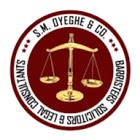FREEDOM OF EXPRESSION AND THE PRESS: Rights and Limitations under the Law
(Part 1)
SEPREBOFA M. OYEGHE ESQ.
The right to freedom of expression and the press is one of the fundamental rights guaranteed by the constitution which is the fons et origo of our legal system.
By this right, everyone has the freedom to hold opinions, receive and impart ideas and information without interference. This right by its nature is the most fundamental tool for good governance in a democratic system. It gives the citizen and the press right to comment on the myriads of issues in the society and the workings and shortcomings of the government. It gives the right to know and be heard by all. It also stipulates the duties of both the press and the citizens. This right is provided under Section 39 of the Constitution.
However, like other rights, the right of freedom of the of expression and press though fundamental is not absolute. The journalist in the practice of his/her profession is often subjected to the ordinary laws of the land. Some laws which limits the exercise of this rights include the Cyber Crime Act, Official Secrets Act, the laws on defamation, laws on treason and treasonable felony etc.
These laws usually come into play while the reporter is gathering news or during the story’s publication. Ideally, freedom of the press should include the freedom to gather news, write it, publish it and circulate it.
In the case of State v. Ivory Thrumpet Publishing Co. Ltd. (1984) 5 NCLR 736, the Court held in. thus:
‘’I am in no doubt whatsoever that any law which restricts the freedom of expression guaranteed to the accused persons under the Constitution is not reasonably justifiable in a democratic society… and I…am not obliged to uphold the validity of such laws… I feel no doubt that any construction of the law on sedition in this country should be against the background of a profound national commitment to the principle that debate on public issues should be uninhibited, robust and wide open, and that it may well include vehement, caustic and sometimes unpleasantly sharp attacks on government and public officials.’’ Arthur v. The State (1985) 6 NCLR 228
But as it has been held recently, Press freedom guaranteed by the Constitution does not say that reporters should publish destructive stories about peoples’ businesses without first having to conduct some investigation before hurrying to the press. Press freedom commands a corresponding measure of responsibility on the part of the reporter who must exercise the highest level of professionalism in ensuring that a balanced and fair reportage of events are published as they have occurred.
In the matter of dissemination of news, the press must ensure the accuracy of its information before it passes it to others as gospel truth. To know the truth and to disseminate untruths to the ignorant, or to disseminate news carelessly and recklessly as to whether it is true or false is the most heinous of all sins under section 39 of the Constitution of Nigeria…” See The Sun Publishing Ltd. & Anor v. Aladinma Medicare Ltd. [2016]9 NWLR (Pt. 1518)557 at page 609-610 Pargs. H-E Per, Oho J.C.A
But as opined by learned writers, while there is need to preserve the rights and reputation of other citizens, ensure the security of the state and public morality, the line of conformity must be drawn between the veritable right to freedom of expression and the press and these derogatory laws.
Recent happening in most countries Nigeria inclusive clearly portrays the fact that the press freedom is gravely threatened. The journalism practice is under intense check. Journalists are exposed to more and more risk. Journalists are still put behind bars for speaking against the ills of government. When a journalist in unnecessarily threatened in his job, journalism gradually losses its place, and the resultant effect is that our right and access to information is adversely undermined.
And that is exactly why the International community must unite and lend its voice to support freedom of information and safety of journalists.
Conclusively on this part, it is quite disheartening that press freedom has become one of the major challenges facing Journalism practice in Nigeria in particular and the world at large. There is now a steady and constant clamp down on journalist and Reporters alike. Anyone who is aggrieved over a publication and feels so strong that a publication concerning him is untrue can have recourse to the court to ventilate his remonstrance and seek redress. The State also has its options under the law. The fact remain that freedom of speech constitutes one of the essential foundations of a democratic society, one of the basic conditions for its progress and development
The publisher also has defences available to him. One of which is the defense of fair comment. This defence is very important for the press who daily examine, and comment on multifarious topic and people.
Fair comment is an impartial observation, opinion or criticism on a matter of public interest, currency, or discourse. It is a dispassionate expression of opinion on fact correctly stated. Therefore, it is a defense to an action for libel that the statement complained of was fair comment on a matter of public interest. The plea is based on the important need to preserve the fundamental right to freedom of expression for a person to comment on any matter of public interest.” See The Sun Publishing Ltd. & Anor v. Aladinma Medicare Ltd [2016]9 NWLR (Pt. 1518)557 at pages 600- 601 Pargs. H- A Per, Oho J.C.A
SEPREBOFA M. OYEGHE ESQ.
Abuja, Nigeria.
seprebofaoyeghe@gmail.com

